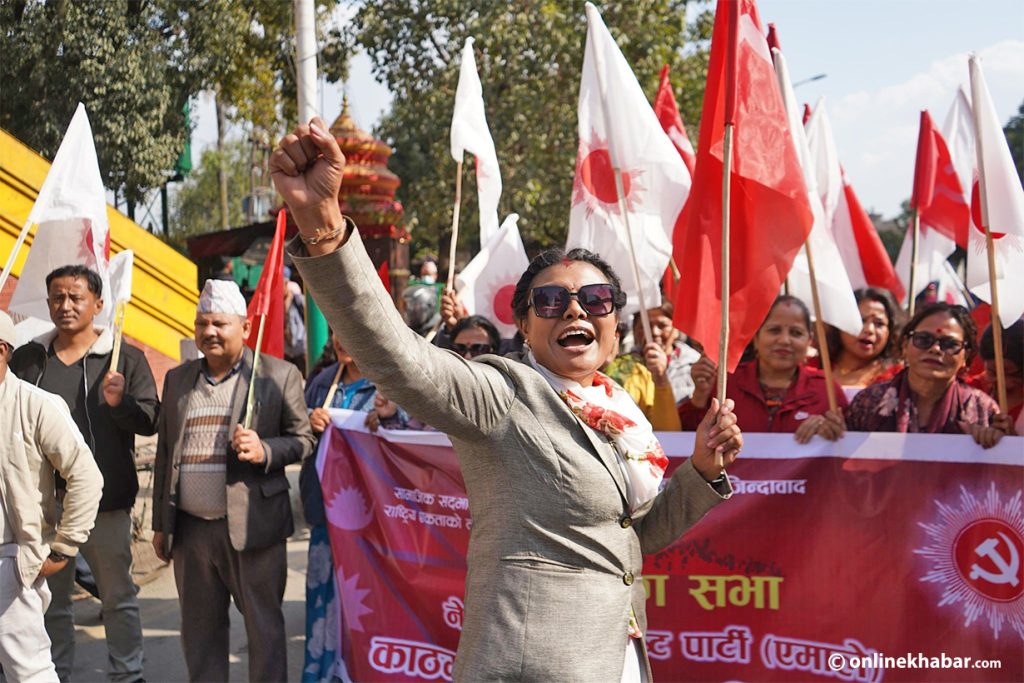
Nepalis leaving the country for foreign employment has become the new normal. But in 2022/23, the number reached a record high. The Department of Foreign Employment reported that this year’s figures surpassed a nine-year-old record, indicating a significant increase in the outflow of Nepali workers seeking employment abroad.
According to Guru Datta Subedi, spokesperson for the Department of Foreign Employment, in the fiscal year 2014/15, a total of 693,032 Nepalis left the country for foreign employment. In the first 11 months of the fiscal year 2022/2023, a staggering number of 740,739 individuals obtained labour permits to work abroad.
“The number is nearly 50,000 more than nine years ago. There are still some days remaining to conclude the fiscal year so the number is expected to reach 800,000,” says Subedi.
With low job opportunities, a dwindling economy along with political instability, the number of people obtaining new labour permits for foreign employment has risen over the years. While traditional destinations like Qatar, Saudi Arabia, UAE, Korea, and Malaysia have been popular choices for foreign employment in the past, there is now a growing demand to leave for European countries. Many people see these destinations as offering better prospects for the future well-being of their families, leading to a rush of individuals leaving the country.
Although this results in increased remittances flowing into the country, experts caution that if this trend persists, the nation may face adverse consequences.
The only way is out

The number of people going for foreign employment was declining after the 2015 earthquake, but the number surged after the Covid pandemic. According to foreign employment expert, Jiwan Baniya, people stopped leaving the country when the constitution was being drafted. He says most young people were hopeful of things changing the country and decided to stay put.
But when the first constituent assembly dissolved, people became agitated and started leaving the country in search of better jobs. In the fiscal year 2014/15 around 700,000 youth left the country for foreign employment and created a new record.
The number in the following year went down as people were involved in reconstruction work in the country following the earthquake. Soon, federalism was implemented in the country. That again gave people hope for development and job prospects as they stayed in the country waiting for change. But the change never came.
According to Baniya, Malaysia not recruiting Nepali labourers and the emergence of the Covid pandemic reduced the number of people leaving for foreign employment in the fiscal year 2019/20.
Now with the pandemic over and unemployment on the rise, people have had enough and are leaving the country for foreign employment.
“Malaysia opening its doors to Nepali workers has helped increase the number too,” he says.
Negligent power-hungry Nepali leaders

Foreign employment expert Madhu Bilash Pandit says the primary reason for Nepalis seeking employment abroad is the absence of sustainable job opportunities within the country. He says people are disappointed with the top leaders of the country for failing them and the country.
“The ongoing power struggles and disregard for the state of the country by these leaders have left many individuals feeling disillusioned,” he says. “It’s no surprise they are leaving.”
The erstwhile Nepal Communist Party, which came to power in 2017, had pledged to end compulsory foreign employment within five years. But the party did not do anything. The budget allocated to create employment opportunities was limited to paper and private sector jobs rarely paid well and did not have job security.
Baniya also says people are leaving to improve their living standards which they believe will not happen by staying in Nepal.
“The youths hoped that federalism would bring good changes, but their hopes turned futile and more youths started getting hopeless,” he says. “The condition led many to seek opportunities abroad.”
European dream

The possibility of exploring new destinations in Europe has contributed to the increasing number of Nepalis seeking foreign employment. The availability of opportunities in European countries has attracted individuals looking for alternative prospects and has consequently played a role in the rise of Nepali migrants to these regions.
Going to European counties like Romania, Malta and Cyprus has become so common that people are renewing their labour permits and going to these counting hoping to enter mainland Europe via these countries.
According to government data, since 2006 the department has issued 5.7 million labour permits. This data does not include the people who returned to the same company and job by renewing their labour permits.
This number does not include people who were taken by agents on visit visas and those who travel through India without obtaining work permits. If one adds all that, the number of Nepalis who left to work abroad might exceed 4 million in the last 10 years, say experts.
Experts say many women are going abroad through illegal routes as the ban on sending domestic workers abroad has not been lifted. Due to this, women workers are compelled to work in an even more unsafe environment.
Due to the absence of a government provision for obtaining a work permit for working in India, the available data does not encompass all individuals who engage in foreign employment south of the border.
Currently, Malaysia, Saudi Arabia, Qatar, UAE, Kuwait, Oman, Bahrain, and South Korea have become the main labour destinations for Nepalis to seek foreign employment.
Younger workers, who have heard about the hardships in these destinations mentioned above are looking for ways to get to Europe and have started going to Croatia, Poland, and Romania. Their goal is to enter mainland Europe and enter countries like Germany, Spain and Italy.
According to Pandit, this has become the only option for the youth as the country’s leadership has no idea how to create jobs in the country.
“The income in Nepal is so low, it does not cover basic needs. These men and women have no option but to leave,” he says.
The rising inflation has not helped either. With the pressure to be as well off as the next person, many feel that leaving the country is the only way they can achieve financial security in life.
This story was translated from the original Nepali version and edited for clarity and length.


























